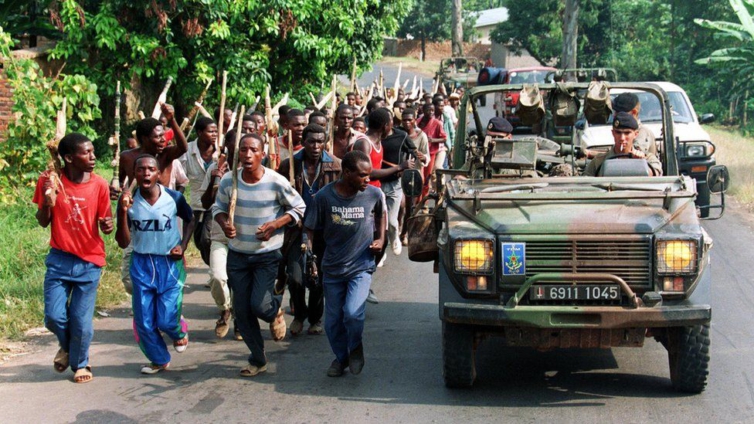France bears "heavy and overwhelming responsibilities" over the 1994 Rwanda genocide, a report by French historians says, but they found no evidence of French complicity.
The expert commission presented the report to French President Emmanuel Macron. The report said France had been "blind" to genocide preparations.
At least 800,000 people died when ethnic Hutu extremists massacred minority Tutsis and moderate Hutus.
The team studied French official files.
Rwanda, which has long accused France of complicity, said it welcomed the report.
The government said it "represents an important step toward a common understanding of France's role in the genocide against the Tutsi".
A Hutu elite ruled Rwanda when the genocide took place, in April-June 1994, but they were later ousted by the Tutsi-led Rwandan Patriotic Front (RPF) under Paul Kagame, who is now president.
The report blames the then French President, François Mitterrand, for a "failure" of policy towards Rwanda in 1994. The findings are being made public after years of French official secrecy over links to the Hutus who ruled Rwanda.
President Macron appointed the 15-member commission two years ago, giving them access to presidential, diplomatic, military and intelligence archives.
Among the archives are those of Mitterrand, who had close ties to former Rwandan President Juvénal Habyarimana, a Hutu.
The genocide was sparked by the downing on 6 April 1994 of a plane carrying Habyarimana and his Burundian counterpart Cyprien Ntaryamira, a fellow Hutu.
The commission members are not Rwanda specialists - that was a deliberate choice to ensure their neutrality, AFP news agency reports. They include experts on the Holocaust, on the massacres of Armenians in World War I and on international criminal law. They are led by historian Vincent Duclert.
On 22 June 1994 the United Nations authorised the deployment of French forces in south-west Rwanda, in what was called Operation Turquoise.
That mission was controversial: the French humanitarian zone saved some potential victims from the genocidal killers, but later there were accusations that the French help had come too late and that some killers had managed to hide in the zone.
In 2015, then-President François Hollande announced that the Rwanda archives would be declassified but two years later, after a researcher sought permission to study them, France's Constitutional Council ruled that they should remain secret.
The Rwandan government said it would soon release its own report, "the conclusions of which will complement and enrich those of the Duclert Commission".
Latest Stories
-
Center for Learning and Childhood Development Director Dr Kwame Sakyi honoured at Ghana Philanthropy Awards
9 hours -
Asantehene receives 28 looted artefacts
10 hours -
CAF WCL 2024: Ghana’s Thelma Baffour wins title with TP Mazembe
10 hours -
Benjamin Boakye slams politicisation of energy sector issues and ECG’s inefficiencies
11 hours -
Erastus Asare Donkor and Dr Neta Parsram win big at 10th Mining Industry Awards
11 hours -
Government is “suppressing information” about power sector challenges – IES Director
11 hours -
Majority of our debts caused by forex shortfall – ECG Boss
11 hours -
Pan-African Savings and Loans supports Ghana Blind Union with boreholes
12 hours -
Bole-Bamboi MP Yussif Sulemana donates to artisans and Bole SHS
12 hours -
Top up your credit to avoid potential disruption – ECG to Nuri meter customers
12 hours -
Dutch & Co wins 2024 Entrepreneur of the Year Award
12 hours -
We’ll cut down imports and boost consumption of local rice and other products – Mahama
15 hours -
Prof Opoku-Agyemang donates to Tamale orphanage to mark her birthday
16 hours -
Don’t call re-painted old schools brand new infrastructure – Prof Opoku-Agyemang tells gov’t
16 hours -
Sunon Asogli plant will be back on stream in a few weeks – ECG
17 hours

